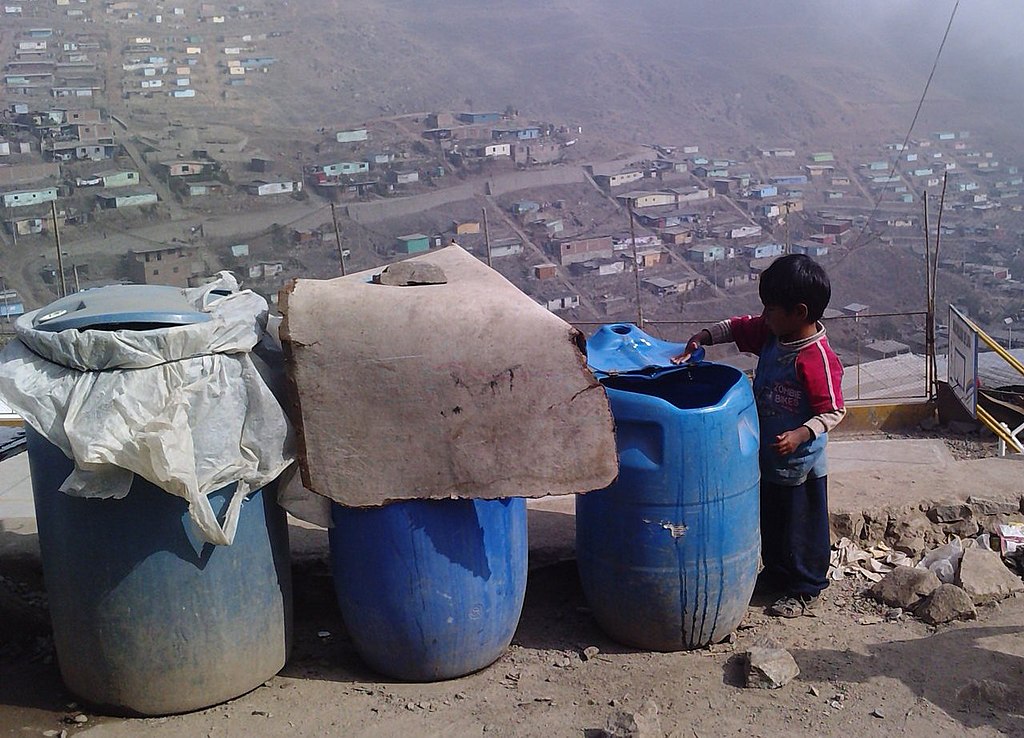Water supply to low income areas is scarce in Lima, Peru.
Peru: Amazon Faith and Civil Leaders Call for Water’s Defense
Amazon Water Summit delegates declare that water is a sacred gift and a fundamental human right, urgently calling for global action to protect it from destructive extractive practices.
More than 400 delegates from ten Amazonian countries and fourteen Peruvian regions convened for three days in October in Iquitos, Peru, for the Amazon Water Summit under the theme: “We Are Water, We Are Life, We Are Hope.”
The gathering united a diverse array of participants— including Indigenous leaders, peasant and river communities, bishops, theologians, and pastoral agents—all committed to the defense of water, one of the planet’s most endangered and essential gifts.
The Declaration on the Right to Water Convened by the Apostolic Vicariate of Iquitos, the Pan-Amazonian Ecclesial Network (REPAM), The Latin American Episcopal Conference (CELAM), and the Vicariate of Water, the summit culminated in the creation of a bold and urgent Declaration on the Right to Water. This declaration asserts that the defense of water is inseparable from the defense of life itself.
The document opens with a stark assessment of the current crisis: “Our rivers are being wounded by mining, oil, drug trafficking, and deforestation. The people who guard them are persecuted, murdered, and forgotten.”
Participants denounced the prevailing extractive model that treats land and water as mere commodities, declaring instead that: “Water is not a commodity; it is a gift from God, it is a human right, it is a sacrament of life.”
The Declaration urged governments “to stop viewing water as a source of power or profit” and to recognize it “as a right that cannot be denied or privatized.”
It also called upon the global Church and civil society to “defend life, care for our Common Home, and promote a culture of water based on respect, equity, and spirituality.”
Insights from the Field
The conviction that water is sacred resonated deeply with attendees like Maryknoll Sister Patricia (Pat) Ryan, who has worked with rural communities in Peru’s southern
highlands. Sister Pat highlighted that the water crisis is not confined to the Amazon basin but originates in the highlands where the Amazon waters begin.
“There is no country that does not suffer from water problems… The same problem exists in every country. We are learning. Water is a living being. It has rights. It must be defended and protected.”
Her organization, DHUMA (Human Rights and the Environment), has filed a case demanding water be recognized as a “subject of rights.” DHUMA partner Yolanda Flores emphasized the responsibility to protect the polluted but powerful river: “If we don’t take care of water, we won’t have life. We have to change our priorities.”
This message points to the core theme: we are water; to harm it is to wound ourselves.
The Church’s Pastoral and Prophetic Role
Bishops at the summit reaffirmed the spiritual and moral urgency of this mission.
- Cardinal Pedro Barreto (Archbishop Emeritus of Huancayo and REPAM founder) stressed the Church’s role is now both pastoral and prophetic, engaging in dialogue with the world to care for our Common Home.
- Bishop Miguel Ángel Cadenas (Apostolic Vicar of Iquitos and summit host) emphasized that the Church’s first task is to listen to those dedicating their lives to preserving
the Amazon for a dignified life for all. - Bishop Rafael Cob García (Vicar Apostolic of Puyo in Ecuador) said, “The right to water is the right to life. It is not an option for us as Christians but a moral obligation.”
Together they affirm Pope Leo’s vision that caring for our common home requires technical changes and spiritual conversion of priorities.
Global Appeal and Commitment
The Iquitos declaration transcends a regional statement, acting as a global appeal for conversion, policy change, and shared responsibility. It closes with a prayerful commitment: “We commit ourselves to defend life, to care for our Common Home, and to promote a culture of water based on respect, equity, and spirituality.”
The summit’s message offers both a challenge and hope: faith communities must become powerful witnesses for the dignity of people and the rights of nature, because “We Are Water, We Are Life, We Are Hope.”
Photo of scarce water supply in low income area of Lima, Peru in 2012 by SuSanA Secretariat and available via Wikimedia commons.

